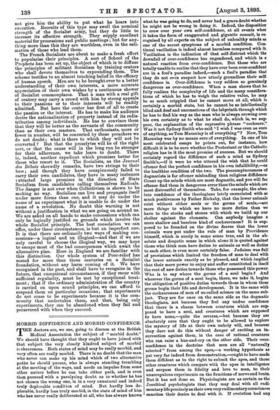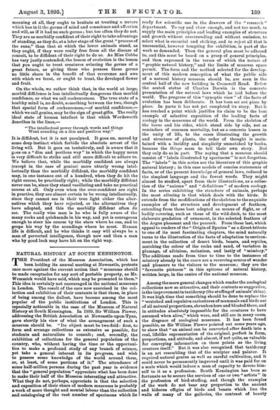MORBID DIFFIDENCE AND MORBID CONFIDENCE. T HE doctors are, we see,
going to discuss at the British Medical Association the subject of "morbid doubt." We should have thought that they ought to have joined with that subject the very closely kindred subject of morbid cccksureness. Both states of mind may be really morbid, and very often are really morbid. There is no doubt that the man who never can make up his mind which of two alternative paths he should pursue, who is always standing trembling at the meeting of the ways, and needs an impulse from some other nature before he can take either path, and is even then pursued with a paralysing doubt as to whether he has not chosen the wrong one, is in a very unnatural and indeed truly deplorable condition of mind. But hardly less de- plorable, hardly less truly morbid, is the state of mind of him who has never really deliberated at all, who has always known what he was going to do, and never had a grave doubt whethet he might not be wrong in doing it. Indeed, the dispositios to crow over your own self-confidence, at all events when it takes the form of exaggerated and gigantic conceit, is re- cognised by all experts on the subject of unhealthy minds as one of the surest symptoms of a morbid condition. Con. tinual vacillation is indeed almost harmless compared with it Vacillation is the indication of that self-distrust which the downfall of over-confidence has engendered, and which is a natural reaction from over-confidence. But those who are totally unable to realise that they have ever been over-confident are in a fool's paradise indeed,—such a fool's paradise that they do not even suspect how utterly groundless their self. confidence is. Over-diffidence is very seldom so genuinely dangerous as over-confidence. When a man shows that he fully realises the complexity of life and the many considera- tions of which he has to weigh the relative value, he may be so much crippled that he cannot move at all, which is certainly a morbid state, but he cannot be so intellectually blind and deaf and unconscious of the labyrinth through which he has to find his way as the man who is always crowing over his own certainty as to what he shall do, which is, we sup- pose, the explanation of the expressive phrase "cocksure." Was it not Sydney Smith who said "I wish I was even as sure of anything, as Tom Macaulay is of everything" P Now, Tom Macaulay was by no means sure of everything. In one of his most celebrated essays he points out, for instance, how difficult it is to be sure whether the Protestant or the Catholic religion has in it the most promise of success. But we should certainly regard the diffidence of such a mind as Sydney Smith's,—if it were he who uttered the wish that he could oftener feel the perfect confidence in his own infallibility,—as the healthier condition of the two. The presumptuousness col dogmatists is far oftener misleading than religious diffidence. Count up the minds which are most dogmatic, and you will fat oftener find them in dangerous error than the minds which are most distrustful of themselves. Take, for example, the abso- lute confidence of the theologians lately enunciated with as much positiveness by Father Rickaby, that the lower animals exist without either souls or the germs of souls,—are mere things to which we have no more duties than we have to the stocks and stones with which we build up our shelter against the elements. Can anybody imagine a more shallow and baseless kind of cocksureness P It is sup- posed to be founded on the divine decree that the lower animals were put under the rule of man by Providence himself, which is surely in some sense trne, and in the ab- solute and despotic sense in which alone it is quoted against those who think men have duties to animals as well as duties to each other, is even more certainly false. Judaism was full of provisions which limited the freedom of man to deal with the lower animals exactly as he pleased, and which implied that their mere power to enjoy and suffer constituted in itself the root of new duties towards those who possessed this power. Who is to say where the germs of a soul begin P And wherever the germs of a soul begin, there, we take it, begins the obligation of positive duties towards those in whom these germs begin their life and development. It is the same with the cocksureness of men of so-called science on the same sub- ject. They are for once on the same side as the dogmatic theologians, not because they feel any undue confidence that there is a chasm between creatures which are sup- posed to have a soul, and creatures which are supposed to have none,—quite the reverse,—but because they are absolutely sure that they ought to be allowed to explore the mystery of life at their own unholy will, and because they dare not do this without danger of exciting an in- surrection against them, in the ease of rational creatures who can raise a hue-and-cry on the other side. Their over- confidence in the doctrine that men are all "naturally selected" from among the apes,—a working hypothesis as yet very far indeed from demonstration,—ought to have made them diffident as to the right to submit the apes, and those other creatures which compare with the apes in intelligence and surpass them in fidelity and love to man, to theil unscrupulous experiments on the functions of nerve and brain. But it has not done so. Physiologists are as certain as the Jesuitical psychologists that they may deal with all rudi. mentary life precisely as their own very rudimentary consciences sanction their desire to deal with it. If evolution had any meaning at all, they ought to hesitate at treating a nature which has in it the germs of mind and conscience and affection and will, as if it had no such germs ; but too often they do not. They are as morbidly confident of their right to take advantage of standing, as they do, at a later stage of the great "process of the suns," than that at which the lower animals stand, as they ought, if they were really free from all the disease of conceit, to be diffident of their right to do so. As Miss Cobbe has very justly contended, the lesson of evolution is the lesson that you ought to treat creatures evincing the germs of a great future, as giving those who possess these germs no little share in the benefit of that reverence and awe with which we treat, or ought to treat, the developed flower and fruit.
On the whole, we rather think that, in the world at large, morbid diffidence is less intellectually dangerous than morbid confidence, or what we call cocksureness. The true state of a healthy mind is, no doubt, something between the two, though that special form of cocksureness,—of morbid confidence,— which we call genius, may be the sign of great gifts. The really ideal state of human intellect is that which Wordsworth describes in the lines,—
" The intellectual power through words and things Went sounding on a dim and perilous way."
It is diffident, but it is not paralysed. It goes on, moved by some deep instinct which forbids the absolute arrest of the living will. But it goes on tentatively, and is aware that it goes on a "dim and perilous way" in which the happy mean is very difficult to strike and still more difficult to adhere to. We believe that, while the morbidly confident are always (except in the case of genius) more utterly wrong intel- lectually than the morbidly diffident, the morbidly confident may, in one instance out of a hundred, when they do hit the right course, be practically right; while the morbidly diffident never can be, since they stand vacillating and take no practical course at all. Only even when the over-confident are right in practice, they are almost certain to be wrong intellectually, since they cannot see in their true light either the alter- natives which they have rejected, or the alternatives they have adopted, and this the morbidly diffident often do see. The really wise man is he who is fully aware of the many rocks and quicksands in his way, and yet is courageous enough to steer his course by the stars where he can, and to grope his way by the soundings where he must. Human life is difficult, and he who thinks it easy will always be a man of perverted intelligence, though now and then a man who by good luck may have hit on the right way.



































 Previous page
Previous page